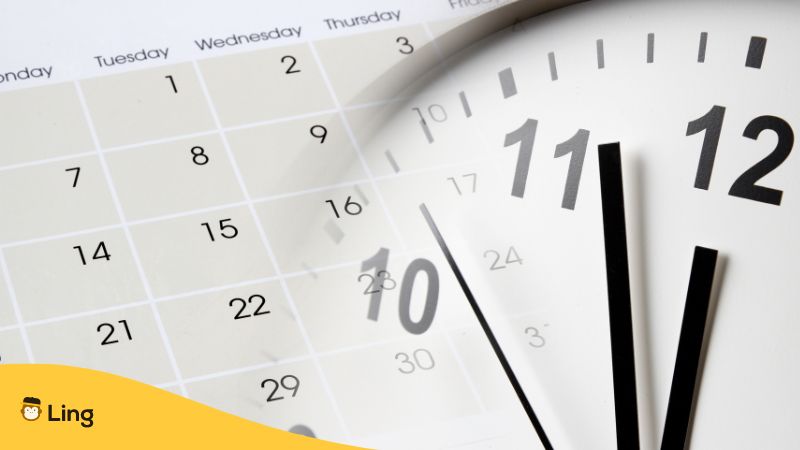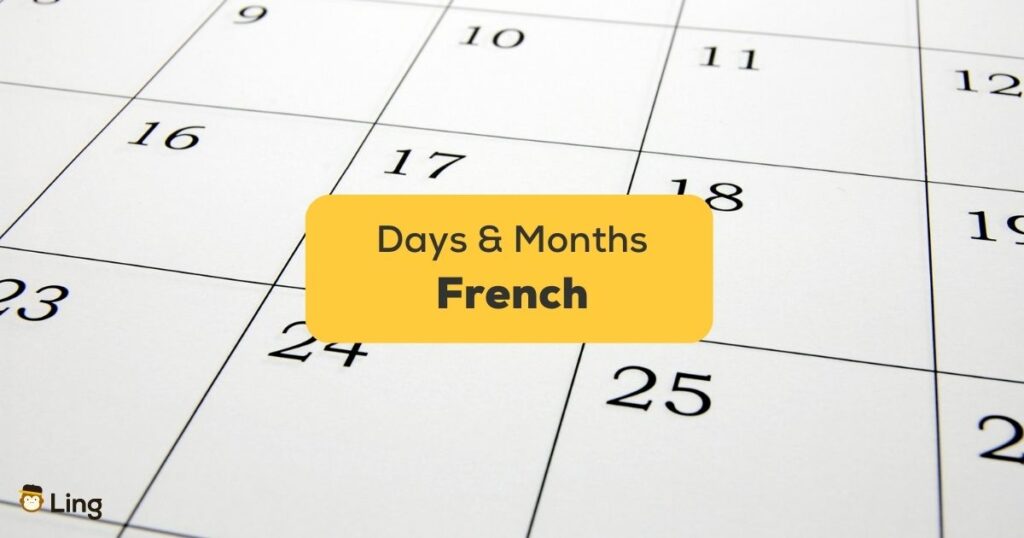Oh là là! Brace yourself for a linguistic adventure like no other! The French language, with its poetic charm and romantic allure, is about to whisk you away into the enchanting realm of French days and months. In this post, we’ll dive headfirst into the captivating world of French language and culture, exploring the vibrant collection of words that make up the fabric of the French calendar. Let’s begin!
You might be wondering why it’s worth your time and energy to learn about French days and months. Well, allow us to illustrate the remarkable benefits and exciting experiences that await you. Picture this: you’re strolling through the charming streets of Paris, fully immersing yourself in the vibrant atmosphere of a bustling local market or savoring a delightful café au lait at a quaint French café. These are the quintessential experiences that make traveling to France so enchanting.
However, here’s the twist: what if you arrive at your favorite café only to find it closed on a specific day? What if you miss out on the lively local market because you didn’t know it’s held on a particular day of the week? The key to avoiding such disappointments lies in mastering the French days and months.
By familiarizing yourself with the specific days and months in the French language, you gain the power to plan your itinerary effectively, ensuring that you make the most of your time in France. You’ll be able to schedule visits to popular attractions, museums, and cultural events without missing out due to closures or limited availability. This knowledge is particularly important when it comes to holidays and celebrations, as they often shape the rhythm of life in France.
Ready to start learning? Let’s begin!

French Days Of The Week
Looking for something easier to remember? Let’s first draw our attention to the French week, which starts on Monday.
| English | French | Pronunciation |
|---|---|---|
| Monday | Lundi | |
| Tuesday | Mardi | |
| Wednesday | Mercredi | |
| Thursday | Jeudi | |
| Friday | Vendredi | |
| Saturday | Samedi | |
| Sunday | Dimanche |

Months In French
Now let’s delve into the poetic world of the months of the year in French. Just like a symphony of words, the French language captures the essence of each month with its melodious names. Prepare to be captivated as we present you with the translations of the months in English and their enchanting counterparts in French:
| English | French | Pronunciation |
|---|---|---|
| January | Janvier | |
| February | Février | |
| March | Mars | |
| April | Avril | |
| May | Mai | |
| June | Juin | |
| July | Juillet | |
| August | Août | |
| September | Septembre | |
| October | Octobre | |
| November | Novembre | |
| December | Décembre |
Basic Sentence Structure Using French Words
Now that we’ve acquainted ourselves with the enchanting words related to French days and months, let’s dive into the basics of constructing sentences using these captivating words. Understanding the sentence structure allows you to express yourself effectively in French and engage in conversations about time-related topics.
Here’s a breakdown of the basic sentence structure:
- Subject: The subject of a sentence refers to the person, thing, or concept that performs the action or is being described.
- Verb: The verb is the action or state of being in the sentence.
- Object: The object is the recipient or target of the action.
Let’s put these elements into practice with examples using the “French days and months”:
- Subject + Verb + Object: In this basic sentence structure, the subject performs an action on the object.
- Example: “Je visite Paris en avril.” (I visit Paris in April.)
- In this sentence, the subject “Je” (I) performs the action “visite” (visit) on the object “Paris” (Paris), specifying that the visit takes place in the month of “avril” (April).
- Subject + Verb: In some cases, the subject and verb alone can form a complete sentence.
- Example: “Lundi est mon jour préféré.” (Monday is my favorite day.)
- Here, the subject “Lundi” (Monday) is paired with the verb “est” (is) to express the statement that Monday is the speaker’s favorite day.
- Subject + Verb + Adverbial Phrase: An adverbial phrase provides additional information about the action or context of the sentence.
- Example: “Nous sortons souvent le samedi.” (We often go out often on Saturdays.)
- In this sentence, the subject “Nous” (We) engages in the action “sortons” (go out), while the adverbial phrase “souvent le samedi” (often on Saturdays) provides information about the frequency and timing of the activity.
Remember, sentence structure in French follows a similar pattern to English, with the subject, verb, and object forming the core elements. By incorporating the “French days and months” into your sentences, you’ll be able to express time-related actions and descriptions more fluently. So, practice constructing sentences using these captivating words and let your French language skills blossom!
Learn The French Language With Ling
Ready to improve your vocabulary and French pronunciation? If the answer is a resounding yes, then now is the best time to try learning the French language with Ling! Ling is a language-learning resource that offers a comprehensive platform designed to help you master French in an engaging and effective way.
With Ling, you’ll have access to a wide range of interactive lessons and exercises that cover all aspects of language learning. From beginner to advanced levels, Ling provides tailored lessons that cater to your specific needs and goals. Whether you’re a traveler looking to navigate France with ease or a student eager to explore the complexities of the French language, Ling has got you covered!
So, why wait any longer? Embrace the beauty of the French language, expand your cultural horizons, and unlock new opportunities by learning with Ling. Download it now from the App Store or Play Store to get started!



































































